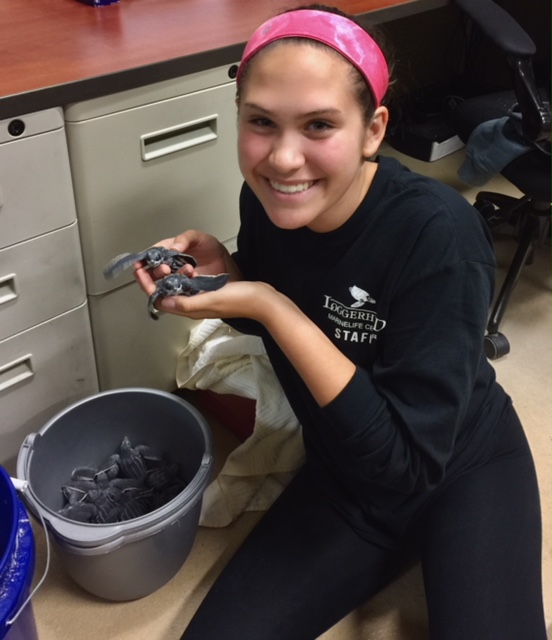Protecting Sea Turtles with Madison Toonder
Pixel Journal contributor, Hannah Yang, discusses marine biology research and life with accomplished OHSer, Madison Toonder.
Maddie’s interest in environmental conservation and protection of different species began when she attended a Busch Gardens zookeeper summer camp in seventh grade. There, she learned about the importance of oysters in the filtration of the world’s waters and how their population health indicates the health of our environment. She also learned that the world’s oyster population is rapidly declining. After further investigation, Maddie developed a research project focused on the effects of the increasing active, chemical ingredients in sunscreen and sunblock. As she continued to network and connect with more mentors, she was able to develop her research concepts and establish a larger platform from which to share her findings and promote conservation of oysters and other key marine species.
Maddie has since moved “up the food chain” from oysters to sea turtles. “Sea turtles are susceptible to innumerable strains of extremely harmful bacteria common in their marine environment and are increasingly vulnerable to opportunistic pathogens such as Fibropapilomatosis,” Maddie explains. “Fibropapilomatosis is a debilitating pathogen that acts similarly to cancer, causing large internal and external tumors which compromise their health.” When she learned that alligator blood rejects many strains of bacteria, she believed it had the potential to reject harmful marine bacteria as well. Inspired, Maddie conducted a comparative immunobiology study to analyze immune-strength of alligator blood in parallel with sea turtle factors. Currently, she is continuing her research with the University of Miami Pathology Lab, Loggerhead Marinelife Center, and University of Florida College of Veterinary Medicine, and has received a marine turtle permit that allows her to handle sea turtles and their blood.
“The ultimate goal of my research is to develop a treatment to effectively boost bacterial-resistance in sea turtle individuals and potentially prevent the disabling impact of Fibropapilomatosis on their population,” Maddie says, “We are using cutting edge technology to provide insight into sea turtle stress indicators [and] working hard to know all that we can [in order to] help perpetuate their species.”
Disclaimer: All marine turtle images taken in Florida were obtained with the approval of the U.S. Fish & Wildlife Service (USFWS) and the Florida Fish & Wildlife Conservation Commission (FWC) under conditions not harmful to this or other turtles. Images were acquired while conducting authorized research activities pursuant to FWC MTP-17-211.
To have pursued such in-depth, impactful scientific research in high school is noteworthy, but Maddie suggests that “there is not a specific formula to becoming a good research scientist”, attributing her successes to determination and passion. “Many people ask me how I developed my previous research topics and was successful at science fairs. I emphasize that I developed my research concepts because I truly believed that there was more we could learn about a species,” Maddie says, “It is necessary to have a genuine desire to pursue your question. With hard work and determination, the resources will present themselves. [...] I approached answers to my questions with a desire to develop solutions. My successes in scientific competitions occurred as a result of my hard work.”
It seems clear that Maddie is well on her way to becoming a marine or exotic animal veterinarian, with a focus on conservation of endangered species through research. How will she make this dream a reality? College is definitely part of the plan. Maddie mentions that her dream school is Duke University, and enthuses about the numerous internship opportunities at their marine institute on the coast and their exotic lemur research center on campus.
While biology is her focus, Maddie also dabbles in a bit of everything else: she plays club volleyball and coaches youth volleyball, has been playing guitar and singing for nine years, volunteers at a local zoo as an educator and animal handler, and she interns at a veterinary hospital where she assists in surgeries. She has even placed second nationally at the Broadcom MASTERS mathematics competition in Silicon Valley.
In each area of interest, Maddie brings forth her best efforts, and it shows. We at the Pixel Journal cannot wait to see where her initiative and passion bring her next.

